- About
-
Advocacy
- Submit Legislative Proposals to the ILA Public Policy Committee
- Advocacy Policies and Procedures
- More Than a Building
- Census 2020 Resources
- Creating or Changing Illinois State Library Law
- Illinois Minimum Wage Resources
- Intro to Property Taxes for IL Libraries
- ILA Public Policy Principles
- Legislative Issues
- Libraries and Immigration Enforcement
- Making Your Case
- Ready, Set, Advocate
- TIFs and Public Library Districts in Illinois
- Top Ten Advocacy Tips
- Unite Against Book Bans in Illinois
-
Committees
- Frequently Asked Questions (FAQ) about ILA Committees
- Advocacy Committee
- Awards Committee
- Conference Program Committee, 2025
- Conference Program Committee, 2026
- Diversity Committee
- Finance Committee
- Fundraising Committee
- ILA Reporter Advisory Committee
- Illinois Libraries Present Committee
- Illinois Public Library Standards Committee
- Intellectual Freedom Committee
- iREAD Committee
- Nominating Committee
- Public Policy Committee
- Reaching Forward North Committee
- Reaching Forward South Committee
- Events
-
Forums
- Frequently Asked Questions (FAQ) about ILA Forums
- Human Resources & Administration Forum (HRAF)
- Illinois Association of College & Research Libraries Forum (IACRL)
- Library Trustee Forum (LTF)
- Marketing Forum (MF)
- Resources & Technical Services Forum (RTSF)
- Retired Members Forum
- Small and Rural Libraries Forum (SARL)
- Students and New Professionals Forum (SANP)
- Young Adult Services Forum (YASF)
- Youth Services Forum (YSF)
- Initiatives
- Membership
- Publications
This bibliography represents books challenged, restricted, removed, or banned in 2012 and 2013 as reported in the Newsletter on Intellectual Freedom from May 2012 to May 2013. (Dates prior to May 2012 indicate the controversy began earlier, but continues into 2012 or 2013.)
Download PDF (804 KB)
Alexie, Sherman
The Absolutely True Diary of a Part-Time Indian
Thorndike Press; Little, Brown
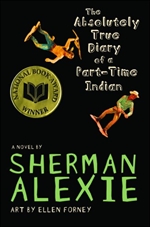
Challenged as required reading in at least three freshmen English classes at Westfield, N.J. High School (2012) because of “some very sensitive material in the book including excerpts on masturbation amongst other explicit sexual references, encouraging pornography, racism, religious irreverence, and strong language (including the f- and n-words).” Challenged at the West Valley School District in Yakima, Wash. (2013) because some parents found the sexual references and profanity in the novel inappropriate for high school students.
Source: Newsletter on Intellectual Freedom, May 2012, pp. 105-6; Mar. 2013, pp. 51-52.
Anderson, M. T.
Feed
Candlewick Press
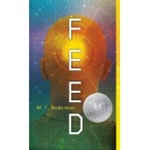
Challenged at the William Monroe High School in Greene County, Va. (2012) because the book is “trash” and “covered with the F-word.” A consent form was sent to the students’ homes, and a notice that the class would be reading a mature book was posted on the teacher’s webpage as well. Among its many awards, the book is a National Book Award Finalist and a Junior Library Guild selection.
Source: Newsletter on Intellectual Freedom, July 2012, p. 159.
Atwood, Margaret
The Handmaid’s Tale
McClelland and Stewart

Challenged as required reading for a Page High School International Baccalaureate class and as optional reading for Advanced Placement reading courses at Grimsley High School in Guilford County, N.C. (2012) because the book is “sexually explicit, violently graphic and morally corrupt.”
Source: Newsletter on Intellectual Freedom, Jan. 2013, p. 11.
Aylisli, Akram
Stone Dreams
Novella published in Druzhba Narodov (Friendship of the Peoples)
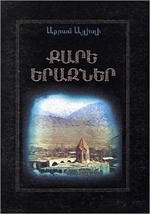
Burned (2013) at various locations around Azerbaijan. The novella is sympathetic to Armenians and recounts Azeri atrocities in the war between Azerbaijan and Armenia twenty years ago. Azerbaijani President Ilham Aliyev stripped the author of his title of “People’s Writer” and the pension that goes with it. A pro-government political party in Baku, Azerbaijan, announced that it will pay $12,700 to anyone who cuts off the ear of the 75-year-old novelist for portraying Azerbaijanis as savages.
Source: Newsletter on Intellectual Freedom, May 2013, pp. 108-9.
Brannen, Sarah S.
Uncle Bobby’s Wedding
Putnam

Challenged, but retained at the Brentwood, Mo. Public Library (2012) despite a resident who did not like the book’s subject matter. The picture book involves a young guinea pig and her beloved uncle, who is going to marry his male partner.
Source: Newsletter on Intellectual Freedom, Jan. 2013, p. 33.
Card, Orson Scott
Ender’s Game
Tor Science Fiction

A teacher at Schofield Middle School in Aiken, S.C. (2012) will not face criminal charges for reading to his students from the science-fiction book. In addition to the Card novel -- which has won several science-fiction awards and is listed on numerous children’s literature review websites as appropriate for readers twelve and older -- the teacher read excerpts from an Agatha Christie novel and a young adult novel set in the Old West, officials said. The incident came to light after the materials were characterized by one student and one parent as pornographic, according to a press release issued by the school district.
Source: Newsletter on Intellectual Freedom, May 2012, p. 107.
Chbosky, Stephen
The Perks of Being a Wallflower
Pocket Books

Challenged as an assigned reading at the Grandview Heights, Ohio High School (2012) because the book deals with drugs, alcohol, sex, homosexuality, and abuse.
Source: Newsletter on Intellectual Freedom, Jan. 2013, pp. 11-12.
Colasanti, Susane
When It Happens
Speak

Challenged, but retained in the teen section of the Helen Matthes Library in Effingham, Ill. (2013) despite concerns that the content is too explicit.
Source: Newsletter on Intellectual Freedom, Mar. 2013, p. 79.
Connell, Richard
The Most Dangerous Game
Perfection Learning; Creative Education

Challenged at the Bromley East Charter School in Brighton, Colo. (2012) because the 1924 short story “only serves to encourage school violence.” English teachers have used it for decades to teach literary concepts like symbols and motifs.
Source: Newsletter on Intellectual Freedom, Jan. 2013, pp. 9-10.
Crawford, Brent
Carter Finally Gets It
Disney Hyperion Books

Challenged, but retained in the Broken Arrow, Okla. middle school libraries (2012) despite a parent’s complaint that it is “vulgar, vulgar, vulgar.” The book was recognized by the Young Adult Library Services Association as one of 2010’s Amazing Audiobooks.
Source: Newsletter on Intellectual Freedom, July 2012, p. 179.
Ehrenreich, Barbara
Nickel and Dimed: On (Not) Getting By in America
Holt

Challenged, but retained on the Easton, Pa. Area High School’s Advanced Placement English reading list (2012) despite several residents and persons from outside the district calling the book “faddish,” of “no moral value,” and even “obscene.”
Source: Newsletter on Intellectual Freedom, May 2012, pp. 128-29; July 2012, pp. 179-80.
Esquivel, Laura
Like Water for Chocolate: A Novel in Monthly Installments, with Recipes, Romances, and Home Remedies
Doubleday

Removed from the reading list at Nampa, Idaho High School (2012) because it was considered too racy for sophomores. The book has been considered a contemporary classic in Latin American literature.
Source: Newsletter on Intellectual Freedom, Nov. 2012, pp. 237-38.
Green, John
Looking for Alaska
Speak

Banned as required reading for Sumner County, Tenn. schools (2012) because of “inappropriate language.” The book won the 2006 Printz award for excellence in young adult literature.
Source: Newsletter on Intellectual Freedom, July 2012, pp. 158-59.
Hergé
Tintin in the Congo
French & European Publications

A Belgian court (2012) rejected a five-year-old bid by a Congolese student to have the 1946 edition of Herge’s book banned because of its racist depictions. “It is clear that neither the story, nor the fact that it has been put on sale, has a goal to … create an intimidating, hostile, degrading or humiliating environment,” the court said in its judgment. The student, who launched the campaign in 2007 to ban the book, plans to appeal.
Source: Newsletter on Intellectual Freedom, Jan. 2012, pp. 17-18; May 2012, p. 130.
Hosseini, Khaled
The Kite Runner
Bloomsbury
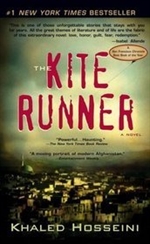
Challenged as optional reading in the tenth-grade honors class at Troy, Pa. area schools (2012) because the novel depicts a rape in graphic detail and uses vulgar language.
Source: Newsletter on Intellectual Freedom, May 2012, pp. 106-7.
Howe, James
Totally Joe
Atheneum Books for Young Readers

Marked for removal in the Davis, Utah School District (2012) because parents might find it objectionable. The title character, a thirteen-year-old boy, writes an alphabiography—his life from A to Z--and explores issues of friendship, family, school, and the challenges of being a gay teenager.
Source: Newsletter on Intellectual Freedom, July 2012, p. 156.
Ignatow, Amy
The Popularity Papers
Amulet

Challenged, but retained at two Prosser, Wash. elementary school libraries (2013). Only available to fifth graders, the book is about two girls who want to unlock the secrets to being popular in middle school. One of the girls has two fathers; the other has only a mother.
Source: Newsletter on Intellectual Freedom, May 2013, p. 124.
James, E. L.
Fifty Shades of Grey
Vintage

Pulled, but later returned to the Brevard County, Fla. public libraries’ (2012) shelves “in response to public demand.” The racy romance trilogy is particularly popular among middle-aged women. Despite overwhelming demand and long wait lists for library copies, some other libraries across the country are refusing to acquire the book.
Source: Newsletter on Intellectual Freedom, July 2012, pp. 145, 147-48.
King, Stephen
Different Seasons
Viking

Challenged, but retained at the Rocklin, Calif. High School library (2012) despite a parent’s complaint that the book contained a graphic rape scene.
Source: Newsletter on Intellectual Freedom, Jan. 2013, p. 33.
Loux, Matthew
SideScrollers
Oni Press

Removed as an option on the Enfield, Conn. school district’s ninth-grade summer reading list (2012) after a parent complained of profanity and sexual references. The graphic novel was chosen as one of the Young Adult Library Services Association’s Great Graphic Novels for Teens in 2008.
Source: Newsletter on Intellectual Freedom, Nov. 2012, p. 237.
Manji, Irshad
Allah, Liberty, and Love
Free Press; ZI Publications

Banned (2012) because officials in Malaysia said it went against Islamic teachings and led to a raid on a bookstore in the country. Activists and others said they believe Manji’s book was banned because she is a lesbian.
Source: Newsletter on Intellectual Freedom, July 2012, pp. 183-84; Sept. 2012, pp. 203-4.
Martinez, Elizabeth
500 Years of Chicano History in Pictures
Southwest Community Resources

Banned from the Tucson, Ariz. Unified School District (2012) along with Critical Race Theory, by Richard Delgado; Message to Aztlan, by Rodolfo Corky Gonzales; Chicano! The History of the Mexican Civil Rights Movement, by Arturo Rosales; Pedagogy of the Oppressed, by Paulo Freire; Rethinking Columbus: The Next 500 Years, edited by Bill Bigelow and Bob Peterson; and Occupied America: A History of Chicanos, by Rodolfo Acuña. In a district with over 60 percent of the students coming from Mexican-American backgrounds, the school board “dismantled its Mexican-American Studies program, packed away its offending books, shuttled its students into other classes,” according to a January 21, 2012, New York Times editorial because “it was blackmailed into doing so.” The Times referred to measures taken by Arizona Superintendent of Public Instruction John Huppenthal, who threatened to withhold millions of dollars if the school district didn’t terminate the nationally acclaimed program immediately. The superintendent has spent years crusading against ethnic studies programs that he claims are “brainwashing” children into thinking that Latinos have been victims of white oppression. On March 8, 2013, a federal court upheld most provisions of an Arizona state law used to prohibit the controversial Mexican-American Studies curriculum in Tucson. Activists plan to appeal the ruling to the U.S. Court of Appeals for the Ninth Circuit.
Source: Newsletter on Intellectual Freedom, Mar. 2012, pp. 49, 51, 82-84; May 2012, pp. 102-3; May 2013, pp. 114-15.
Moore, Alan
Neonomicon
Avatar Press
Banned at the Greenville County, S.C. Public Library (2012) after a patron’s teenage daughter checked it out of the library’s adult section. The teenage girl was given an adult library card, which allowed her to check out adult-themed books. The head of the library system overturned an internal review committee’s decision to retain the graphic novel because the pictures gave her pause.
Source: Newsletter on Intellectual Freedom, Sept. 2012, p. 201; Mar. 2013, pp. 48-49.
Morrison, Toni
Beloved
Knopf; NAL

Challenged, but retained as a text in Salem, Mich. High School Advanced Placement English courses (2012). The complainants cited the allegedly obscene nature of some passages in the book and asked that it be removed from the curriculum. District officials determined the novel was appropriate for the age and maturity level of Advanced Placement students. In reviewing the novel, the committee also considered the accuracy of the material, the objectivity of the material, and the necessity of using the material in light of the curriculum. Challenged at the Fairfax County, Va. schools (2013) because a parent complained that the book “depicts scenes of bestiality, gang rape, and an infant’s gruesome murder.” The novel won the Pulitzer Prize for fiction in 1988.
Source: Newsletter on Intellectual Freedom, Mar. 2012, pp. 79-80; May 2012, pp. 127-28; Mar. 2013, pp. 50-51.
Myers, Walter Dean
Fallen Angels
Scholastic

Challenged on the Danbury Middle School reading list in Toledo, Ohio (2013) because of inappropriate language. The book depicts the reality of the Vietnam War, with sometimes gruesome descriptions of combat and frequent foul language from soldiers.
Source: Newsletter on Intellectual Freedom, May 2013, p. 104.
Naylor, Phyllis Reynolds
Intensely Alice
Atheneum Books for Young Readers; Simon Pulse

Challenged, but retained in the Buffalo, Mo. middle school (2013) despite the principal’s formal complaint against several “very questionable pages” featuring a safe sex scene.
Source: Newsletter on Intellectual Freedom, May 2013, pp. 123-24
Othman, Norani, ed.
Muslim Women and the Challenges of Islamic Extremism
Sisters in Islam
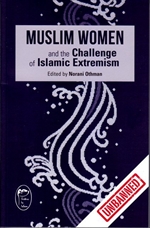
Banned by the Malaysian Ministry of Home Affairs (2008) on the grounds that it was “prejudicial to public order” and that it could confuse Muslims, particularly Muslim women. The Malaysian High Court overturned the ban on January 25, 2010, and on March 14, 2013, the Federal Court threw out the government’s appeal to reinstate the ban.
Source: Newsletter on Intellectual Freedom, May 2013, pp. 125-26.
Palahniuk, Chuck
Fight Club
W. W. Norton

Removed from the Katy, Tex. Independent School District required reading list (2012) following parental complaints about the book’s violent nature and explicit undertones.
Source: Newsletter on Intellectual Freedom, Mar. 2013, p. 50.
Parr, Todd

The Family Book
Little, Brown
Banned from an Erie, Ill. elementary school’s shelves (2012) because of a line that reads, “some families have two moms or two dads.” The district also banned everything furnished by GLSEN (Gay, Lesbian and Straight Education Network), including learning materials and various programs aimed at preventing bullying.
Source: Newsletter on Intellectual Freedom, July 2012, p. 157; Sept. 2012, pp. 202-3.
Pelzer, Dave
A Child Called It
HCI

Challenged at the Housel Middle School in Prosser, Wash. (2013) because the autobiography provides graphic depiction of child abuse. Middle-school students had to have parental permission to check out the book.
Source: Newsletter on Intellectual Freedom, Mar. 2013, p. 49.
Plum-Ucci, Carol
The Body of Christopher Creed
Harcourt

Challenged, but retained in the Appleton, Wis. Area School District (2012), despite the book’s references to suicide and sex. Other titles also considered inappropriate by the local parent group, Valley School Watch, include Catcher in the Rye and The House on Mango Street. The reading list for the group’s ideal alternate class would contain books with no profanity, obscenity, or sexual material.
Source: Newsletter on Intellectual Freedom, July 2012, p. 180.
Polacco, Patricia
In Our Mothers’ House
Philomel Books

Removed from the shelves of elementary school libraries in Davis County, Utah (2012) after a group of parents raised objections about the suitability of the story. It remained available only if a student presented a permission slip from a parent to check out the book. A parent then sued the Davis School District in November 2012 alleging her children’s First Amendment rights were violated by the book’s removal. On January 15, 2013, the book was reinstated without restrictions and the school district agreed to pay $15,000 in attorneys’ fees for the lawsuit brought by the American Civil Liberties Union (ACLU).
Source: Newsletter on Intellectual Freedom, July 2012, pp. 155-57; Sept. 2012, pp. 201-2; Jan. 2013, pp. 7-8; Mar. 2013, p. 80.
Richardson, Justin, and Peter Parnell
And Tango Makes Three
Simon
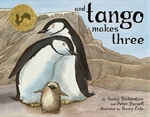
Marked for removal in the Davis, Utah School District (2012) because parents might find it objectionable.
Source: Newsletter on Intellectual Freedom, July 2012, p. 156.
Satrapi, Marjane
Persepolis: The Story of a Childhood
Pantheon Books

Removed, via a district directive, from all Chicago, Ill. public schools (2013) due to “graphic illustrations and language” and concerns about “developmental preparedness” and “student readiness.” Seventh- and eleventh-grade students study the graphic novel about the author’s experience growing up in Iran during the Iranian revolution as part of Chicago Public Schools’ Literacy Content Framework. As the news spread of the directive, students mobilized a media campaign in opposition to “banning a book that’s all about the freedom of speech.” Students took to their Facebook and Twitter accounts, checked out all library copies of the book, wrote blogs, sent e-mails, wrote investigative articles for the student newspaper, contacted the author, staged protests, and appeared on local radio and television programs. Eventually, the school issued a letter telling high school principals to disregard the earlier order to pull the book.
Source: Newsletter on Intellectual Freedom, May 2013, pp. 103-4.
Shakespeare, William
Romeo and Juliet (No Fear Shakespeare)
SparkNotes

Some parents in Liberty, S. C. (2012) are furious about the book their kids are reading in middle school. They say it’s too mature for their kids because of the sex. The book in question is an easy-to-read version of Shakespeare’s Romeo and Juliet.
Source: Newsletter on Intellectual Freedom, May 2012, p. 107.
Sittenfeld, Curtis
Prep
Random House

Removed from the Emmaus, Pa. High School ninth-grade summer reading list (2012) because the story of a girl from Indiana who goes to a boarding school in New England was “too mature for ninth graders.” Instead, it was added to the twelfth-grade Advanced Placement reading list.
Source: Newsletter on Intellectual Freedom, Jan. 2013, p. 12.
Smiley, Jane
A Thousand Acres
Anchor

Removed from the Katy, Tex. Independent School District required reading list (2012) following parental complaints about references to sex and violence.
Source: Newsletter on Intellectual Freedom, Mar. 2013, p. 50.
Swift, Graham
Waterland
Vintage

Challenged as a text in Salem, Mich. High School Advanced Placement English courses (2012) due to the book’s sexual content. Superintendent Jeremy Hughes immediately pulled the book, but later decided to put the book through the district’s review process. The book was reviewed and retained.
Source: Newsletter on Intellectual Freedom, Mar. 2012, pp. 59-60; May 2012, pp. 127-28.

 iREAD Summer Reading Programs
iREAD Summer Reading Programs Latest Library JobLine Listings
Latest Library JobLine Listings